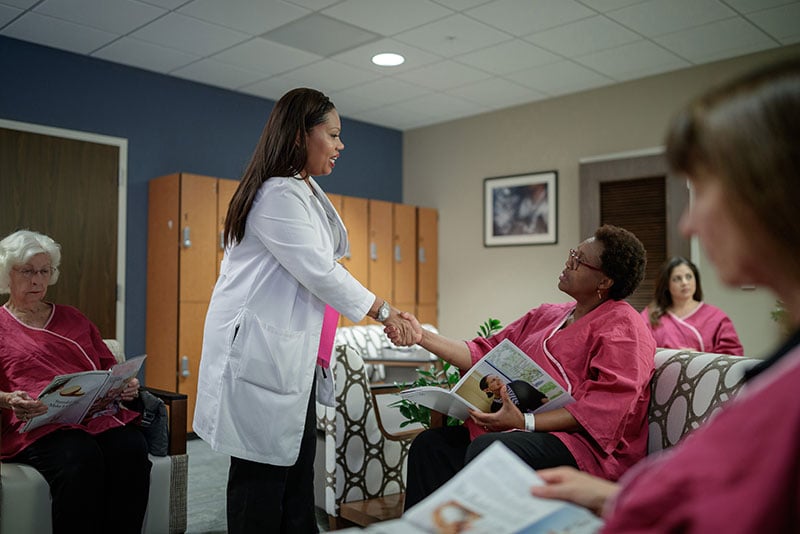Mammography Screening: Frequently Asked Questions
Regular breast screening is vital because it can help detect breast cancer before a lump becomes noticeable. A clinical breast exam is a physical examination of the breasts and underarm area performed by a healthcare provider to detect lumps, masses and other abnormalities. It is still important for women to perform monthly self-exams to help ensure they are familiar with how their breasts normally look and feel. Any lumps or physical changes can then be promptly discussed with a healthcare professional.

-
When should I get a mammography screening?
Moffitt Cancer Center recommends annual screening mammograms beginning at age 40 for most women, and earlier for women who have an increased risk of developing breast cancer.
-
How do I prepare for a mammogram?
Steps to take to prepare for a mammogram.
- Schedule your appointment during the week after your menstrual period to minimize discomfort
- Avoid wearing deodorant, antiperspirant, lotion, perfume, and talcum powder to ensure the most accurate results
- Wear a loose-fitting top that you can easily remove and put back on
- Wear jewelry that you can easily remove before the test.
-
What are the types of mammograms?
There are two main types of mammograms:
- Screening mammograms – A screening mammogram is an early detection tool used to check for possible signs of breast cancer in women who do not have any symptoms.
- Diagnostic mammograms – A diagnostic mammogram is an exam used to evaluate an abnormal finding detected on a screening mammogram or to evaluate symptoms such as pain, a lump, or nipple discharge.
-
Who reviews the result of the mammography?
The subspecialized breast imaging radiologists at Moffitt are highly skilled and experienced in performing the latest breast cancer screening and diagnostic techniques for all women, including those with breast implants.
-
What if my mammogram shows an abnormality?
It’s important to keep in mind that a change in breast tissue seen on a mammogram does not conclusively prove cancer. Most of the abnormalities detected through mammography turn out to be benign (noncancerous).
-
What does it mean to have dense breasts?
Dense breasts are very common and not necessarily a cause for concern. Breast density is simply a measure of the amount of non-fatty tissue about the amount of fatty tissue within a breast. In general, dense breasts have more supportive tissue (stroma) and glandular tissue, which produces and drains milk, than non-dense breasts.
-
Should I be concerned if I have dense breasts?
If you have dense breasts (and even if you don’t), certain lifestyle habits can help you lower your breast cancer risk. These include maintaining a healthy weight exercising regularly, limiting your consumption of alcoholic beverages, eating a nutritious diet, and not smoking. In addition to making any necessary lifestyle changes, you may be advised by your physician to have more frequent cancer screenings and additional tests, such as breast ultrasounds and MRIs.
-
Do women with breast implants still need regular mammography screening?
Routine mammograms are still recommended for women with breast implants (excluding those who received a double mastectomy, or surgery to remove both breasts, before receiving implants). An average-risk woman with or without breast implants should receive a mammogram once every year starting at age 40.
-
If I have a family history of breast cancer, should I be concerned?
Women with close family members who have been diagnosed with breast cancer face a significantly higher risk of developing this disease. However, both women and their healthcare providers tend to overestimate the importance of family history when calculating breast cancer risk. Most women diagnosed with breast cancer have no family history of the disease. In addition, having family members who have certain other types of cancer can also increase a woman’s risk for breast cancer.
-
Do I need a referral to get a Moffitt mammography screening?
Moffitt is streamlining access to world-class cancer care by welcoming patients without referrals.
If you would like to request an appointment for a mammogram and risk assessment at Moffitt Cancer Center, call 1-888-663-3488 or complete our new patient registration form online. M
